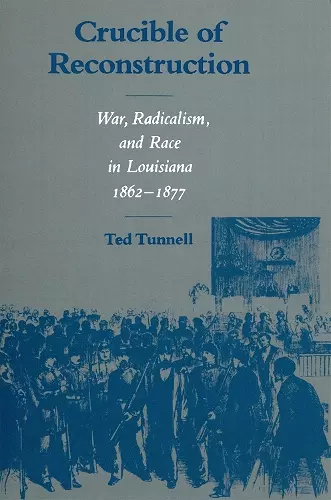Crucible of Reconstruction
War, Radicalism, and Race in Louisiana, 1862-1877
Format:Paperback
Publisher:Louisiana State University Press
Published:30th Jul '92
Currently unavailable, and unfortunately no date known when it will be back

In late April, 1862, Union warships slipped past the Confederate river forts below New Orleans and blasted the Rebel fleet guarding the city. Advancing overland, General Benjamin F. Butler occupied New Orleans on May Day, and for the duration of the war the Stars and Stripes waved over the Confederacy's largest city. The reconstruction of Louisiana began almost immediately.
In Crucible of Reconstruction, Ted Tunnell examines the byzantine complexities of Louisiana's restoration to the Union, from the capture of New Orleans to the downfall of the Radical Republicans a decade and a half later. He writes with insight about wartime Reconstruction and the period of presidential Reconstruction under Andrew Johnson, but his ultimate concern is with Radical Reconstruction and that uneasy coalition of Unionists, free blacks, and carpetbaggers that formed the Louisiana Republican party after Appomattox and struggled fitfully for a biracial society based on equality and justice.
One of the distinguishing features of Crucible of Reconstruction is its concern with the origins of Radicalism. Tunnell finds that nearly two-thirds of Louisiana Unionists were actually outsiders, men who had come to Louisiana from the North or from abroad. Of the remainder, many had either been born in the border slave states that sided with the North in 1861 or had been deeply influenced by Northern culture. The free blacks were the most radical element of the Republican party and for a brief but critical moment actually dominated the reconstruction process; with a black majority in the constitutional convention of 1867-1868, they drafted a civil rights program that made Louisiana's Reconstruction constitution, along with South Carolina's, a model of Republican Radicalism. In the end, though, the carpetbaggers dominated Republican Reconstruction. Although few in number, they controlled the immense federal bureaucracy centered in New Orleans, and in a government that depended on support from Washington for its very survival, they alone had influence on the Potomac.
For a generation historians have struggled to explain the destructive factionalism that crippled the Republican regimes in Louisiana and other Reconstruction states. In a thesis of wide applicability, Tunnel shows how Republican factionalism was actually rooted in a larger ""crisis of legitimacy."" Louisiana Republicans confronted enemies who challenged not merely their policies but their very right to exist,...
ISBN: 9780807118030
Dimensions: unknown
Weight: unknown
257 pages